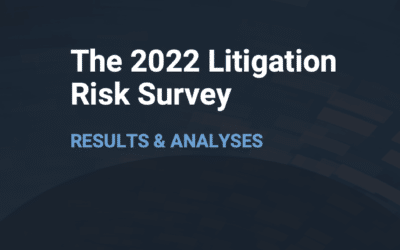This article was originally published in the Corporate Counsel magazine on law.com.
Mergers and acquisitions are expected to make a strong comeback in the months ahead, as COVID-19 vaccinations increase and business recovers from the pandemic-related economic downturn. Even now, the deal market is exhibiting renewed strength, with transactions increasing during the second half of 2020 and into the first quarter of 2021.
Still, uncertainty lingers, and as a recent article published by NASDAQ noted, “ultimately, dealmakers that remain ‘deal ready’ will be best positioned to reap rewards in 2021.” Optimally, for dealmakers and their counsel, this means squaring away any transaction-derailing risks as early as possible in the deal process.
One of the most challenging of those potential risks is litigation. Threatened, pending, or ongoing litigation matters can scuttle transactions, reduce sale prices, and saddle a freshly merged enterprise with unfavorable deal terms and significant out-of-pocket costs just as it is integrating operations.
Enter litigation buyout (LBO) insurance. LBO insurance is designed to offset litigation-related risk during the transactional process and to limit liability faced by a company once a deal has been completed. LBO insurance essentially serves to ring-fence the litigation, transferring risk to the insurer and removing the uncertainty that can complicate or kill deals.
In this article, we examine how litigation buyout insurance works and its potential benefits for companies, and we consider practical examples—based upon actual cases—of how LBO insurance has been deployed to reduce transactional risk and help companies remain “deal ready.”
How LBO Insurance Works
With litigation buyout insurance, the insurer agrees, in exchange for a premium, to take on the financial risks and liabilities associated with a known, threatened, or existing class action, antitrust, or non-class case at any time prior to a final settlement. LBO insurance policies can cover the full spectrum of legal subjects, including securities and other class actions, antitrust matters, products liability, tax risks, and intellectual property disputes.
Policies are customized to address the unique legal issues facing a particular company, and they can be crafted to address a full spectrum of unique litigation risks. Once a policy is in place, the insurance carrier typically takes over defense of a case, pays defense costs, and covers any adverse judgments.
With traditional insurance policies, carriers provide coverage for unexpected losses. Even deal-related policies, like representation and warranties insurance, are generally offered to compensate for an unforeseen event that causes a loss for the insured.
LBO insurance policies are different. They are written to cover any existing, threatened, or anticipated claims. This can mean, for example, that a company may already be facing a significant judgment that is hampering its ability to finance or complete a deal. With an LBO insurance policy, the insurer would assume the risks of the ongoing litigation, and manage any appeal or potential settlement negotiations with plaintiffs.
Potential Benefits
LBO insurance is particularly useful in cases where a settlement is not an immediate option or where a deal must be completed quickly. Policies frequently expedite or even salvage M&A transactions, because the insurance carrier is accepting the financial risk and liability for a known, fixed cost. This allows the insured to move forward with its business opportunities.
When liability issues—such as unknown or uncapped litigation exposure—arise during a deal, a company is often required to place significant cash in escrow. Alternatively, a portion of sale proceeds may be withheld and paid out over time, with indemnified claims offset by deferred amounts.
Because the insurance carrier assumes liabilities for litigation, the need for escrows or indemnities is negated under an LBO policy. This provides certainty and finality for both parties in a transaction, and it frees up capital that would have otherwise remained dormant for a significant period of time (often a year or more).
As a balance sheet matter, litigation can be particularly damaging for a company seeking a merger or financing. Under generally accepted accounting principles, legal costs immediately accrue to the bottom line, and high probability contingent liabilities must be estimated and recorded as a potential loss. This can depress sales prices and spook potential lenders or investors. With so much at stake, companies may also be tempted to cloak potential liabilities from a prospective merger partner. This can be devastating as well, undermining confidence in the accuracy of deal disclosures.
An LBO policy helps remove financial liabilities associated with a piece of litigation from the balance sheet. It can also promote greater clarity about potential legal issues, and build trust that the seller is being above-board and complete in its disclosures. In addition, aside from its financial costs, litigation requires a significant expenditure of time and effort by in-house lawyers and executives. Because the insurance carrier has taken on the litigation obligations under a litigation buyout policy, however, the company is able to return its energy to critical operational issues.
Real World Performance
An LBO insurance policy can have an immediate impact on the course of a deal. The brief case studies that follow illustrate a number of the ways LBO insurance has been deployed by both the buy- and sell-side companies to transfer risk and create substantial value for their investors, including:
- Sidestepping escrow requirements and salvaging an M&A deal. A private equity firm sought to purchase a company facing a wage-and-hour lawsuit in California, a particularly hostile jurisdiction for wage-and-hour defendants. Although the parties considered the risk of liability remote, the damages claimed were substantial and materially altered the terms of the transaction. The PE firm’s representation and warranties insurance excluded this type of litigation risk, and the seller declined to fund an escrow account to cover the potential liability. An insurance policy was created with a liability limit equal to the proposed escrow deposit and that covered defense costs, as well as first-dollar losses, without any deductible. Ultimately, this policy eliminated the need for the seller to tie up funds in escrow and helped push the transaction across the finish line.
- Proceeding with an acquisition despite multimillion-dollar class action exposure. A buyer sought to acquire a company defending a multimillion-dollar class action. Although the target company believed it could avoid liability, the acquiring company was concerned: The appellate court had reversed the trial court’s prior dismissal, and plaintiffs had engaged a top law firm to try the case. As such, the acquiror demanded that the entire potential exposure be placed in escrow pending the outcome of the trial and any appeals, which could take several years. To avoid this, the target company worked with insurers to ring-fence the risk via a significant coverage policy. The insurance policy and the reduced size of the liability retained by the target company gave the acquiring company sufficient comfort to complete the transaction.
- Reviving a deal derailed by a competitor’s patent infringement suit. Litigation risk can occur as a result of a proposed deal—including cases from competitors hoping to disrupt a transaction. In one case, an acquiror sought to buy a privately held company as part of a roll-up transaction. As negotiations progressed, the buyer’s chief competitor sued the private company for patent infringement. Although the buyer believed the suit was merely an effort to interfere with the transaction, it sought an escrow indemnity from the target company. The target company’s shareholders refused, and the deal stalled. The acquiror was then able to arrange for an insurance policy to cover the target company’s exposure. This removed uncertainty from the transaction and allowed the buyer and target to move forward with their deal.
- Unlocking a company’s capital, credit, and sale possibilities after a significant judgment. After losing a $20 million judgment, a small company and its owner, a private equity firm, felt paralyzed. An appeal bond compromised the company’s cash position and prevented the private equity firm from pursuing sale opportunities. Further, the company’s lenders had constrained its borrowing ability. Rather than waiting for the appeal to play out, the company negotiated an insurance policy crafted for its unique position. The policy placed a cap on the company’s exposure if the appellate court affirmed the decision. Policy in hand, the company was able to recoup its cash, reopen its lines of credit, and market itself to potential buyers.
- Allowing shareholders to benefit from an arbitration award despite a pending appeal. For one public company, a $600 million arbitration award appeared to be a significant windfall. But it found that the losing party’s agreement to provide a full satisfaction payment to avoid post-judgment interest also allowed it to appeal the award and, if successful, recover funds in a subsequent proceeding. Given the chance of an appellate reversal, a post-appeal recovery proceeding, and additional arbitration and appeals, all of which could take many years, the public company was unable to take advantage of its award. The company then sought “judgment preservation insurance”—a form of LBO insurance that helps shield the proceeds of an award or judgment from reversal on appeal and from other procedural costs. With a bespoke policy, the company freed up cash and was able to disburse a sizable dividend to shareholders.
- Boosting share price and sale value following an accounting restatement. Shareholders brought suit against a company whose share price dropped after it made an accounting restatement to address irregularities. The suit blocked the planned sale of the company, and the company’s reputation and employee morale began to deteriorate. Fighting back, the company purchased an LBO insurance policy. The policy helped remove the cloud of uncertainty hanging over the company, helped it boost share prices, and allowed the sale to proceed—at a higher valuation.
- Preserving a board of directors whose D&O claims were denied. When a private equity firm threatened to bring suit against one of its portfolio companies to oust its directors, the company made a claim under its directors and officers (D&O) liability policy. The claim was denied, and the directors nearly resigned. The portfolio company then negotiated an LBO insurance policy, which gave it a two-year option to purchase $5 million in coverage for defense, costs, and any damages, with no retention amount. As a result, the directors were able to remain in place.
- Supplementing coverage to reduce the impact of claims on a company’s sale price. Litigation buyout insurance can also be used to supplement other insurance that may not fully cover potential claims. Consider this case involving a business defending a series of product liability suits. The company was negotiating its sale, but the buyer’s purchase price reflected a worst-case-scenario estimate of the seller’s liability. The seller possessed existing liability insurance, but it decided to seek an additional $40 million in coverage via a “catastrophic equity protection policy” to help grapple with potential product liability claims. The policy removed the uncertainty surrounding litigation from the transactional process, and allowed the seller to achieve a purchase price that reflected its full value.
Removing Uncertainty
As the scenarios above demonstrate, LBO insurance can be adapted to fit a wide array of complex litigation issues. A policy can act as a cap, stop-loss, or hedge against adverse judgments and appeals. It can help remove obstacles from the path of deals and assist companies in preparing themselves for a sale. And it can be used free up capital that can be devoted to operations or returned to shareholders. In the end, the aim is to take uncertainty off the books and allow companies to move forward with transactions that will help them to grow and thrive.
Dean Gresham is a managing director at Risk Settlements. Risk Settlements provides solutions that remove the uncertainty of litigation by transferring the outcome risk. He can be reached at [email protected].






